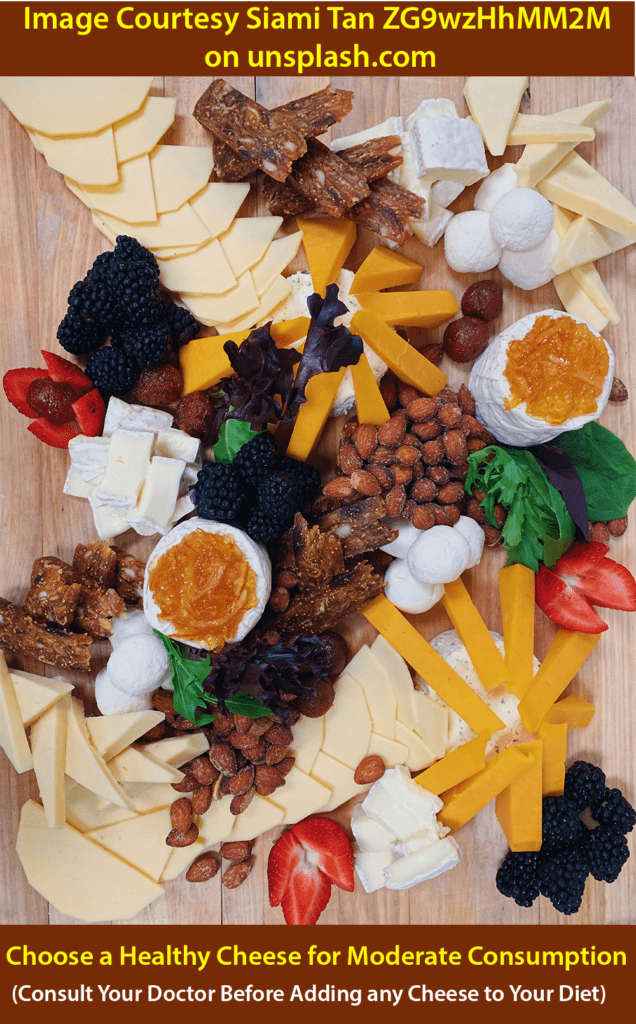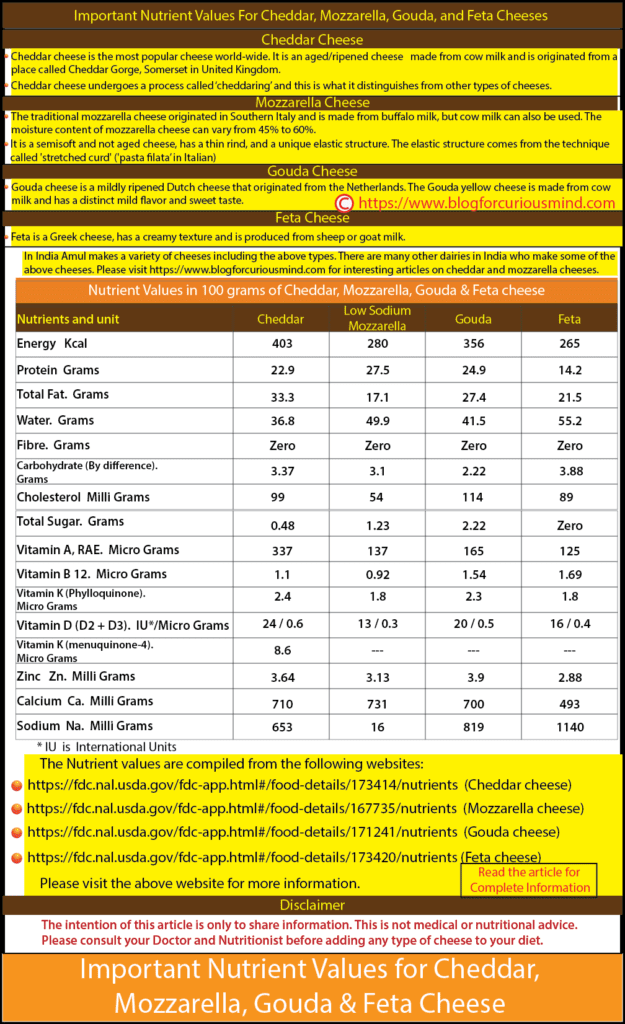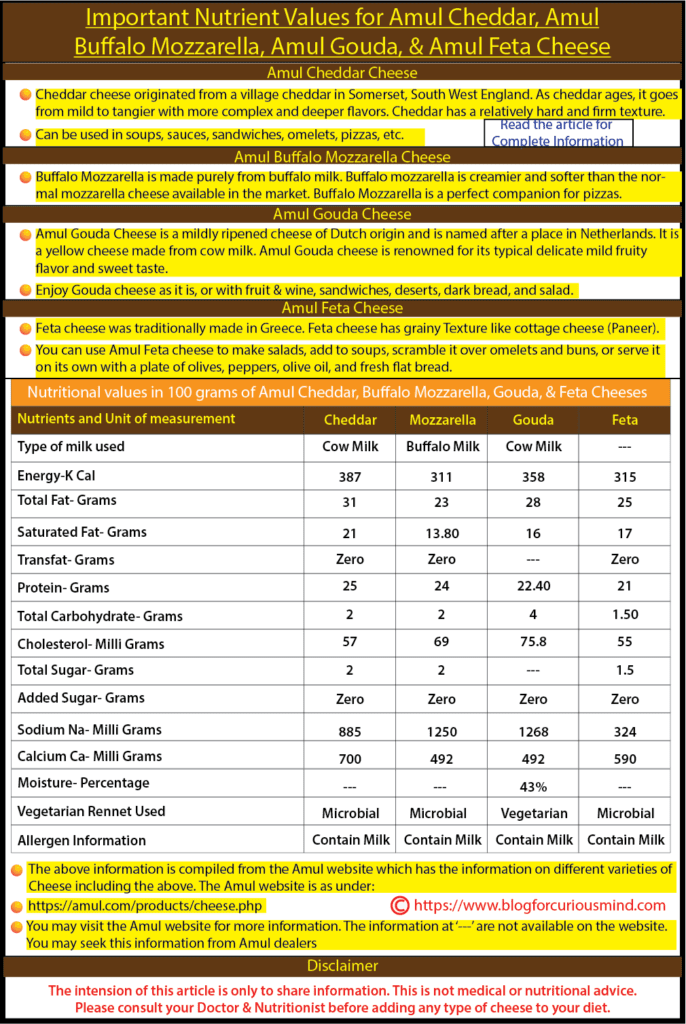Introduction
Over the last four or five decades, cheese has gained reasonable popularity amongst the Indians at a slow but steady phase. Cheese is more popular in metros, mini-metros, and large towns. One reason is the opening of fast-food restaurants that serve and home-deliver pizzas, burgers, sandwiches, and other foods where cheese is a major ingredient. There are small eating places and street food joints that serve Indian fast foods and traditional Indian foods like parathas and they use cheese as an ingredient to attract people, especially, the younger generation.
But, people with health consciousness often feel guilty when consuming cheese and the following questions may frequently come to their mind:
- Is cheese good for me
- Health benefits of cheese, and
- Nutritional value of cheese per 100 gram
This article briefly discusses the above questions.
Health benefits of cheese
Cheese is gradually and steadily gaining popularity in India. It is mainly due to the advent of fast-food restaurants in cities and towns that serve, and home-deliver pizzas, sandwiches, and burgers, where cheese is a major ingredient. People use cheese to make pizzas and sandwiches at home.
However, cheese is high in fat, and health-conscious people want to avoid it. But even a high-fat food cheese can provide a few astonishing health benefits when consumed moderately. And, there are low-fat and low-sodium cheeses to choose from.
Cheese is made from milk obtained from cows, buffaloes, sheep, or goats and is identified as a whole food since it is close to its natural form which is milk. However, this applies to cheeses made with minimal processing.
Cheese contains many beneficial nutrients including protein, vitamins A, B12, D, and K, zinc, and calcium.
The nutrition benefits you may derive from cheese depend on the type of cheese you consume; you should keep away from highly processed cheese that uses additives and supplements.
Read the labels on the cheese packing and consult your doctor and dietician before adding any cheese to your diet.


Possible health benefits of cheese
- The calcium content in cheese is good for building strong bones and healthy teeth. Calcium helps prevent age-related bone problems like weak bones (osteoporosis).
- The protein content in cheese is good for strong muscles.
- Vitamins A, D, K, and Zinc in cheese may contribute to healthy bones.
- Studies show that moderate consumption of cheese with minimal processing can be healthy. However, please select the cheese and its consumption portion in consultation with your doctor.
- The antioxidants in cheese are beneficial to your health.
- Cheese contains probiotic bacteria (beneficial bacteria) which is important for your gut health.
- Moderate consumption of cheese can be a good source of protein and fat for vegetarians.
But, like a coin has two faces, cheese has its own health risks too!
The health risks of cheese
- The protein in milk is called casein and many people may be allergic to casein. If you have not tested yourself for casein allergy, please do not consume cheese without consulting your doctor and getting yourself tested for casein allergy.
- Some people may have digestion issues with lactose, the natural sugar in cheese. Such people should keep away from cheese. If you are in doubt, consult your doctor before adding cheese to your diet. Lactose intolerance can lead to serious health issues including diarrhea.
- Cheese contains saturated fat and sodium. High consumption of saturated fats and sodium can be a cause of high blood pressure, diabetes, and heart disease. Consult your doctor to know whether you can add cheese to your diet and if yes, what is the size of the portion.
- Processed cheese like cheese spread contains additives and is not considered healthy.
- Constipation is an issue with children who consume plenty of dairy products including cheese and less of foods containing dietary fibers.
Nutritional value of cheese per 100 gram
The images below show the nutritional values of four popular types of cheese viz. Cheddar, Mozzarella, Gouda, and Feta. The value of nutrients varies from manufacturer to manufacturer.
The first image shows the nutritional value of cheese per 100 grams for four types of cheeses viz. Cheddar, Mozzarella, Gouda, and Feta. Please visit the websites shown in the image for more details.
The second image shows the nutritional value of cheese per 100 grams for four types of Amul cheese viz. Amul Cheddar, Amul Buffalo Mozzarella, Amul Gouda, and Amul Feta cheese. Please visit the Amul website shown in the image for information on other types of cheeses.

Frequently asked questions on cheese (FAQ)

Is cheese good for me
Moderate consumption of cheese with minimal processing has some possible health benefits. But, you must consult your doctor and nutritionist before adding any type of cheese to your diet. Also, please ensure you are not allergic to casein (milk protein) in cheese and not having digestion issues with lactose (a natural form of sugar) in cheese.
I am a vegan and intolerant to lactose and I feel deprived of eating cheese.
If you are a person intolerant to lactose or are a vegan and feeling bad about not being able to try cheese. There is some good news.
You can say ‘cheese’ to cheese made from soybeans, almonds, and cashews. But, watch out for its ingredients, and do not forget to consult your doctor and nutritionist before adding them to your diet.
Is cheese vegetarian or nonvegetarian
This is a valid question. Out of the many cheeses available, only a few have a vegetarian tag.
A cheese is vegetarian or not depends on the source of rennet which is a crucial ingredient in making cheese. Rennet is a coagulant that converts liquid cheese milk into cheese curd from which the cheese is made.
A cheese made from rennet sourced from plants is termed vegetarian cheese. Rennet sourced from plants is called vegetarian rennet. Cheese made with vegetarian rennet carries a vegetarian tag.
Microbial rennet is not sourced from animals, hence vegetarians can consume cheese made using microbial rennet.
Cheese made from rennet sourced from animals does not have a vegetarian tag. Normally young calf is the source of animal rennet.
Cheeses like paneer and cottage cheese do not use rennet; the milk is curdled only using a starter like lemon juice or citric acid. These have vegetarian tags.
Read the article ‘What is vegetarian cheese Made of ‘for more details.
You may like to watch this, this, this, and this (English & Hindi) YouTube video on the article topic.
Conclusion
Like milk, a cheese with minimal processing can be considered as a whole food. Moderate consumption of selected cheese may be good for you. However, whether cheese is good for you or not depends on your health condition; hence you must consult your doctor and nutritionist before adding any type of cheese to your diet.
Cheese can be consumed as it is as an appetizer, with snacks and cookies, and of course with fast foods like pizzas and burgers.
Disclaimer
The intention of this article is only to share information. This is not medical or nutritional advice. Please consult your doctor and nutritionist before adding any type of cheese to your diet.
You may read other articles on cheese in this blog. ‘Rennet ‘, ‘How Cheddar Cheese is Made’, ‘Cheese Consumption in India’, ‘How to make Mozzarella Cheese at Home’, ‘How Mozzarella Cheese Made in Factory’, ‘Cheddar Cheese Manufacturing Process’, and ‘Mozzarella Cheese Manufacturing Process’.
You may visit the following websites
https://www.webmd.com/diet/health-benefits-cheese
https://www.medicalnewstoday.com/articles/326269#milk-and-bone-health
The nutrient values of Cheddar, Mozzarella, Gouda, & Feta cheese are compiled from the following websites.
https://fdc.nal.usda.gov/fdc-app.html#/food-details/173414/nutrients (Cheddar cheese)
https://fdc.nal.usda.gov/fdc-app.html#/food-details/167735/nutrients (Mozzarella cheese)
https://fdc.nal.usda.gov/fdc-app.html#/food-details/171241/nutrients (Gouda cheese)
https://fdc.nal.usda.gov/fdc-app.html#/food-details/173420/nutrients (Feta cheese)
The nutrient values of Amul Cheddar, Amul Buffalo Mozzarella, Amul Gouda, & Amul Feta cheese are compiled from the Amul website:

